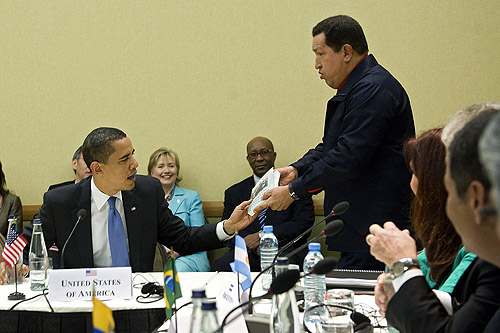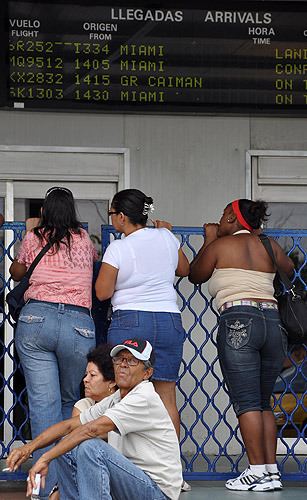|
 |
|
GIFT: Venezuelan President Hugo Chavez gives a book, The Open Veins of Latin America, to U.S. President Barack Obama during a multilateral meeting to begin during the Summit of the Americas in Port of Spain, Trinidad and Tobago, on April 18 (XINHUA/AFP) |
Tensions between the United States and its long-term Latin American rivals Cuba and Venezuela have recently showed signs of relaxation. U.S. President Barack Obama warmly greeted Venezuelan President Hugo Chavez at the Fifth Summit of the Americas in Port of Spain, Trinidad and Tobago, in April. He also accepted a book from Chavez as a gift. Chavez announced plans to restore his country's ambassador to the United States after meeting with Obama at the summit. At the end of April, he gave back a U.S. island that a Venezuelan oil company had purchased from the United States.
The United States has adjusted its policy toward its sworn enemy Cuba even more quickly. Since April, it has eased restrictions on Cuba in terms of travel, family visits, remittances and commercial purchases. Thomas Shannon, Assistant Secretary of State for Western Hemisphere Affairs, has held two meetings with representatives of the Cuban Interests Section in Washington, D.C. These were the most important meetings of substance since the United States imposed a comprehensive embargo against Cuba in the early 1960s.
These adjustments indicate that the Obama administration is taking a new approach toward Latin America. Latin American countries are also placing hopes on the current U.S. administration in light of their traditional interests and immediate needs. Relations between the United States and Latin America, which were frozen during George W. Bush's presidency, are warming up thanks to the new measures the United States has taken, especially Obama's low-key, pragmatic and cooperative stance at the Fifth Summit of the Americas. However, the process is bound to be extremely difficult, given the domestic and international challenges facing the Obama administration and the structural problems in U.S.-Latin America relations.
A timely change
Obama's recent tour to Latin America was believed to be an ice-breaking one. For the first time since his inauguration, the U.S. president took part in multilateral talks on Western Hemisphere affairs. On this occasion, he made an important attempt to address the diplomatic problems he has inherited from Bush by using his "smart power" strategy.
During Bush's eight-year presidency, the United States saw its relations with Latin America, its traditional "backyard," deteriorate because of its indifference toward the region and excessive interference in its affairs. Cuba did not go through a regime change as Washington had pushed for, but gained greater regional support and international influence. Venezuelan President Hugo Chavez and Bolivian President Evo Morales emerged as new anti-American champions. Even major regional powers Brazil and Argentina were becoming alienated from the United States. At the Fourth Summit of the Americas in Argentina in 2005, Bush experienced unprecedented isolation and neglect. All his grand visions, such as a free trade area in the Western Hemisphere, had to be shelved. U.S.-Latin America relations hit their lowest point in history.
 |
|
ON ARRIVAL: Cubans wait for the arrival of the flight from Miami, the United States, at the Jose Marti International Airport in Havana on April 13. The United States lifted all curbs on travel and money transfers by Cuban-Americans to Cuba for the first time in three decades (XINHUA/AFP) | It has long been in Washington's core interests to maintain U.S. dominance in the Americas. As it shifted its strategic focus to the Middle East and the Asia-Pacific region following the September 11 terrorist attacks in 2001, the United States was worried that China and Russia may take advantage of its declining influence in Latin America to fill the power void in the region. The American media and business communities are suspicious of the development of trade and energy ties between China and Latin America in recent years. Last year, Russia carried out a strategic bomber patrol and a naval exercise with Venezuela. It also boosted its trade in ammunitions and military cooperation with Brazil and Peru. These moves further wracked the sensitive nerves of U.S. hardliners. Some farsighted U.S. officials and think tanks have called for changes in Washington's policy toward Latin America.
The United States is also determined to improve its relations with Latin American countries because of the global financial crisis. The United States and Latin American countries enjoy deep-rooted trade ties. To date, the United States has invested more than $600 billion in Latin America. It operates many large projects there in the fields of finance, infrastructure and resource exploitation. Annual bilateral trade volume amounted to nearly $600 billion in the last two years. Latin American countries are highly dependent on the United States economically. If the crisis continues to spread in Latin America, U.S. economic interests will be severely jeopardized.
Moreover, the United States has learned lessons from its past failures. Washington has long been used to interfering in Latin American affairs with tough measures, a strategy that has proved unsuccessful. U.S. Secretary of State Hillary Clinton recently conceded that Washington's policy of isolating Chavez has not worked. In this context, it is only natural for the United States to adjust its policy toward Latin America.
Mutual dependence
The United States is Latin America's most important cooperative and trade partner. This is a common consensus across Latin America, from Venezuela to Mexico and Brazil. Ninety percent of Mexican exports go to the United States. Remittances from the United States account for more than 20 percent of Central American countries' gross domestic product. The United States is the biggest trade partner of Brazil and Chile and the biggest buyer of Venezuela's oil. Changes in the U.S. economy and trade policy can have a direct bearing on Latin American countries.
|
